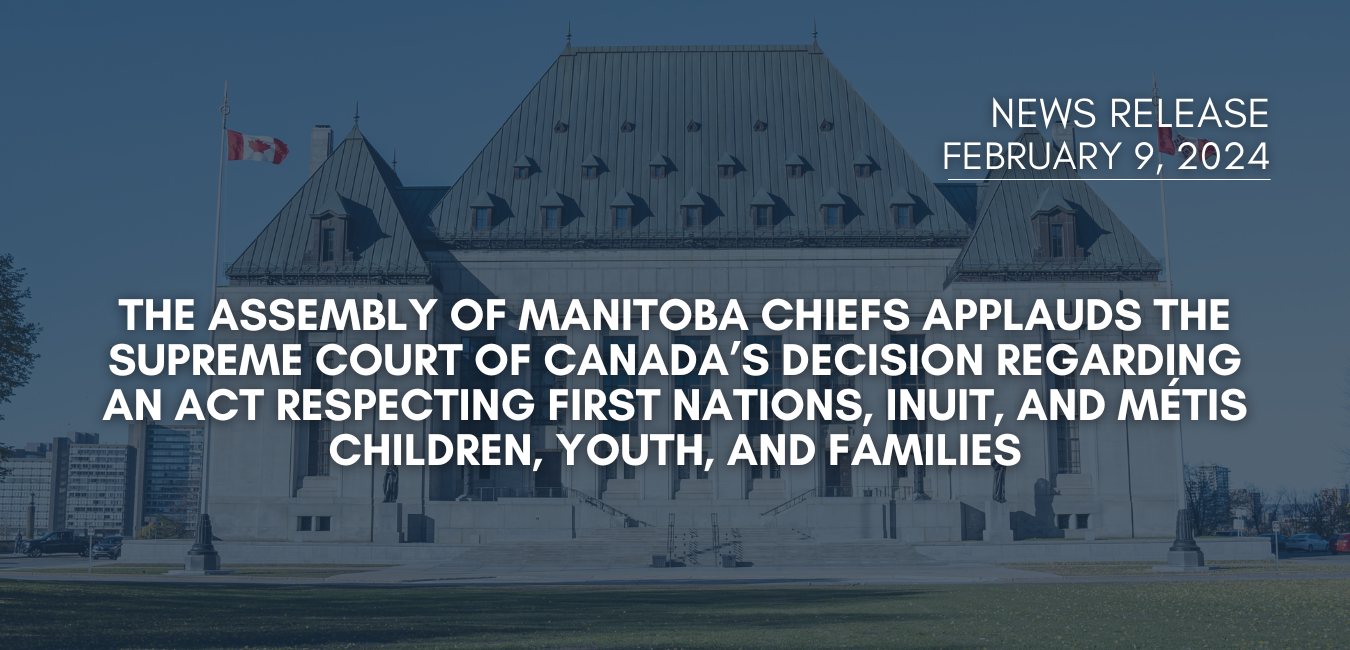The Assembly of Manitoba Chiefs Applauds the Supreme Court of Canada’s Decision Regarding An Act Respecting First Nations, Inuit, and Métis Children, Youth, and Families

February 9, 2024
Treaty One Territory, Manitoba
AMC Communications
Treaty One Territory, Manitoba – The Assembly of Manitoba Chiefs (AMC) is overall pleased with the decision of the Supreme Court of Canada’s decision in Reference to An Act respecting First Nations, Inuit, and Metis children, youth and families (the Act).
AMC Grand Chief Cathy Merrick states, “The Supreme Court of Canada’s recognition of the right of self-government of First Nations people as it relates to children and family services under section 35 of the Constitution represents an important step to address the over-representation of First Nations children in the child welfare system in Manitoba.”
The AMC and the First Nations Family Advocates Office (FNFAO) of the AMC were intervenors in the Supreme Court of Canada case, which was heard in December 2022. Both the AMC and FNFAO argued that while the Act is significant, it represents a half-step towards reconciliation because the laws created by First Nations are constrained by the limits of Canadian laws and subject to Canada’s veto.
“The AMC recognizes that this decision is positive for First Nations who are developing laws under this framework with the goal of protecting their children from the discriminatory provincial regime. To that end, the AMC is encouraged by the Court’s finding that the Act is constitutionally valid and that laws by First Nations can be incorporated into federal law, enabling them to be paramount over provincial laws,” continues Grand Chief Merrick.
The Supreme Court of Canada’s decision confirms that the well-being of First Nations children is integral to the well-being of our families, cultures and Nations. The Supreme Court of Canada relied on Canada’s commitment to implementing the United Nations Declaration on the Rights of Indigenous Peoples and principles of reconciliation to affirm the right of First Nations to self-government with respect to child welfare under section 35.
Grand Chief Merrick continues, “We celebrate this decision on behalf of our Nations who are developing their child and family welfare laws for the protection of our First Nations children. It is encouraging that the Court recognizes that when a child remains with their family and Nation, the sharing of culture is strengthened, and the best interest of the child is promoted. However, we note that the Supreme Court of Canada failed to clearly recognize that First Nations have their own laws and legal systems that are distinct from Canadian laws. The AMC will continue to advocate wholeheartedly for this recognition. In the meantime, we will assert our sovereignty using our own mechanisms as well as those available to us within the colonial legal framework.”
“While the Supreme Court of Canada decision does not go far enough, we must acknowledge the significance of this decision. We are hopeful that it will be a positive move towards ending unnecessary apprehensions of First Nations children on the basis of poverty, racial and cultural bias, and systemic racism. We expect Manitoba and Canada to work together with First Nations in Manitoba to ensure the wellbeing of First Nations children in a manner that is respectful of First Nation sovereignty,” concludes Grand Chief Merrick.
For more information, please contact:
Communications Team
Assembly of Manitoba Chiefs
Email: media@manitobachiefs.com
About the Assembly of Manitoba Chiefs
The AMC was formed in 1988 by the Chiefs in Manitoba to advocate on issues that commonly affect First Nations in Manitoba. AMC is an authorized representative of 62 of the 63 First Nations in Manitoba with a total of more than 171,000 First Nation citizens in the province, accounting for approximately 12 percent of the provincial population. AMC represents a diversity of Anishinaabe (Ojibway), Nehetho / Ininew (Cree), Anishininew (Ojibwe-Cree), Denesuline (Dene) and Dakota Oyate (Dakota) peoples.